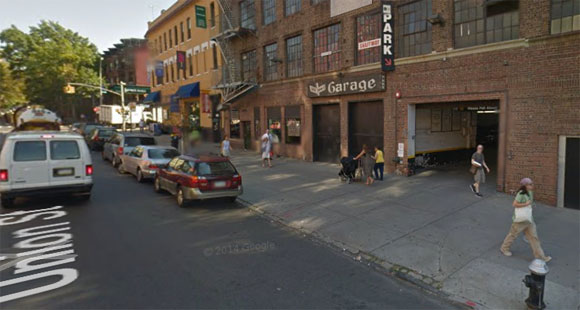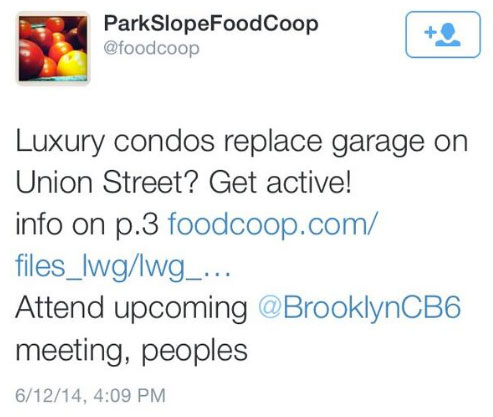In a rational world, the Park Slope Food Co-op opposing the conversion of an enormous garage into car-free mixed-use development would be as likely as Halliburton sponsoring every bike-share system in the country.
We don't live in a rational world.
Everyone's favorite symbol of eco-conscious Brooklyn (disclosure: my wife and I are card-carrying Co-op members -- love the cheap organic produce!), has published what can only be described as a confused screed by local resident Jon Derow, arguing against turning a nearby 230-car garage into a car-free, residential-plus-retail development. The piece ran yesterday in the Co-op's in-house newspaper, The Linewaiter's Gazette.
Now, the Co-op itself hasn't taken an official position on the project, and it's completely unremarkable for the Gazette to print a ludicrous opinion by one of the Co-op's 16,000 members. But this particular publication decision is unusual because the piece comes with a preface from Co-op co-founder and General Manager Joe Holtz implicitly endorsing Derow's perspective and urging members to attend an upcoming Community Board 6 meeting where the project will be discussed:
The International Principles of Cooperation call for cooperatives to have "Concern for Community" and for cooperatives to "work for the sustainable development of their communities." In addition, our Mission Statement calls for us to be a responsible neighbor. In the coming weeks the General Coordinators will be discussing what our Coop’s response might be to the issue our neighbor Jon Derow has alerted us to. Please read Jon’s letter below, printed here with his permission, and please consider attending the Community Board 6 Land Use Committee meeting. —Joe Holtz, General Coordinator/General Manager
How might the transition from car storage to human housing affect the "sustainable development" of the Co-op's community? Well, Derow predicts that turning the garage into 28 apartments and 7,000 square feet of retail will cause more drivers to circle for parking and lead to new headaches with double-parked delivery trucks. Because the garage houses 13 Zipcars, which have been shown to help curb car ownership, Derow says the conversion signals the impending arrival of "195 additional privately owned cars on our streets."
To set the record straight: The garage itself generates car trips on Union Street. If anything, traffic on this block will decline without it. People inclined to pay for off-street parking have other options a short walk away, and people inclined to cruise for cheap curbside spaces aren't going to park at an expensive garage in the first place. Cruising can be reduced by pricing meters so there are more open parking spaces, and truck deliveries can be handled with loading zones. There are Zipcars in several other nearby locations, so the neighborhood car-share fleet is going to be fine.

There are a lot of upsides to the project. Without cars coming and going over the gigantic curb cut that feeds this garage, walking to the Co-op will be a little safer and more pleasant, and biking up Union with a rear rack loaded with groceries will be a little less stressful. If the B71 bus ever comes back, there will be one less traffic magnet on Union Street adding to congestion and slowing down transit. And the new housing will do its small part to keep its affluent incoming residents from driving up rents in farther-out, more affordable sections of Brooklyn.
If the Gazette is going to give equal time to these viewpoints, it can't really happen soon enough for the upcoming CB 6 meeting, which will start a few hours after the next issue of the Gazette is released on June 26. Meanwhile, the Co-op's Twitter feed issued an uncharacteristic call to arms yesterday about the dreaded prospect of converting expensive car storage into expensive housing for people, before backtracking, claiming neutrality, and deleting the original tweet.
I called the Co-op to speak to Holtz about the decision to run this piece. He's on jury duty today and wasn't available. However, at the Co-op's most recent General Meeting (which I attended for workslot credit -- don't ask!), Holtz said the garage may serve as a parking option of last resort for Co-op shoppers searching for a spot, and referred obliquely to the menacing new Gowanus Whole Foods and its acres of parking -- presumably, that's the competition.
I should mention that the garage conversion was relatively uncontroversial at a CB 6 committee hearing, where the main complaint was that the developer gave inadequate notice, according to a member of the public who attended. Also, this project only needs approval from the Board of Standards and Appeals, not the whole City Council. So there probably isn't going to be a huge fight over this. Mainly, I think it's a great story because we now see that even the International Principles of Cooperation can be co-opted to defend a private parking garage.
That, and I expect the pageviews will be spectacular.







